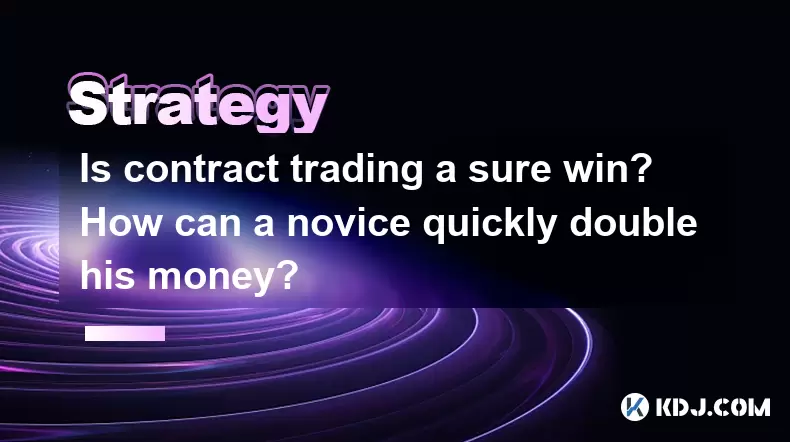-
 bitcoin
bitcoin $87959.907984 USD
1.34% -
 ethereum
ethereum $2920.497338 USD
3.04% -
 tether
tether $0.999775 USD
0.00% -
 xrp
xrp $2.237324 USD
8.12% -
 bnb
bnb $860.243768 USD
0.90% -
 solana
solana $138.089498 USD
5.43% -
 usd-coin
usd-coin $0.999807 USD
0.01% -
 tron
tron $0.272801 USD
-1.53% -
 dogecoin
dogecoin $0.150904 USD
2.96% -
 cardano
cardano $0.421635 USD
1.97% -
 hyperliquid
hyperliquid $32.152445 USD
2.23% -
 bitcoin-cash
bitcoin-cash $533.301069 USD
-1.94% -
 chainlink
chainlink $12.953417 USD
2.68% -
 unus-sed-leo
unus-sed-leo $9.535951 USD
0.73% -
 zcash
zcash $521.483386 USD
-2.87%
Is contract trading a sure win? How can a novice quickly double his money?
Contract trading offers high returns but is risky; novices should educate themselves, start small, and use demo accounts to double their money safely.
Jun 07, 2025 at 03:35 pm

Is contract trading a sure win? How can a novice quickly double his money?
Contract trading, also known as futures trading, has become increasingly popular within the cryptocurrency community due to its potential for high returns. However, the question of whether it is a sure win is a complex one that requires a nuanced understanding. For a novice looking to quickly double their money, the journey is fraught with risks and requires careful strategy and education. This article will delve into the intricacies of contract trading and provide guidance for novices aiming to navigate this volatile market.
Understanding Contract Trading
Contract trading involves buying or selling contracts that represent an agreement to buy or sell a cryptocurrency at a predetermined price in the future. Unlike spot trading, where you directly buy and sell cryptocurrencies, contract trading allows you to speculate on the future price movements without owning the underlying asset. This can be done through futures contracts or options contracts.
In the context of cryptocurrencies, futures contracts are agreements to buy or sell a specific amount of a cryptocurrency at a set price on a future date. Options contracts, on the other hand, give the buyer the right, but not the obligation, to buy or sell the underlying asset at a set price before the contract expires. Both types of contracts can be used to hedge against price volatility or to speculate on price movements.
Risks and Rewards of Contract Trading
Contract trading offers the potential for high returns, but it also comes with significant risks. The leverage used in contract trading can amplify both gains and losses. For instance, if you use 10x leverage, a 1% increase in the price of the underlying asset can result in a 10% gain on your investment. However, a 1% decrease can lead to a 10% loss.
Volatility is another key factor to consider. Cryptocurrencies are known for their price swings, which can be both a blessing and a curse for contract traders. While volatility can provide opportunities for quick profits, it can also lead to substantial losses if the market moves against your position.
Strategies for Novice Traders
For a novice looking to quickly double their money, it's essential to approach contract trading with a well-thought-out strategy. Here are some steps to consider:
Educate Yourself: Before diving into contract trading, take the time to learn about the market, the different types of contracts, and the platforms that offer them. Resources such as online courses, books, and forums can provide valuable insights.
Start Small: Begin with a small amount of capital that you can afford to lose. This will allow you to gain experience without putting your financial stability at risk.
Use a Demo Account: Many trading platforms offer demo accounts where you can practice trading with virtual money. This can help you get a feel for the market and test your strategies without real financial consequences.
Set Clear Goals and Limits: Define your profit targets and stop-loss levels before entering a trade. Stick to these limits to avoid emotional decision-making.
Diversify Your Portfolio: Don't put all your eggs in one basket. Spread your investments across different assets to mitigate risk.
Tools and Resources for Contract Trading
To succeed in contract trading, it's crucial to use the right tools and resources. Here are some essential ones:
Trading Platforms: Choose a reputable platform that offers a user-friendly interface, robust security features, and a wide range of trading options. Popular platforms include Binance, Bybit, and FTX.
Technical Analysis Tools: Use tools such as charts, indicators, and trend lines to analyze market trends and make informed trading decisions. Platforms like TradingView offer a comprehensive suite of technical analysis tools.
Risk Management Software: Utilize software that helps you manage your risk by setting stop-loss orders and tracking your portfolio's performance. Tools like Coinigy and Cryptohopper can be beneficial.
Community and Forums: Engage with the cryptocurrency community through forums and social media platforms. Websites like Reddit and Twitter can provide real-time insights and tips from experienced traders.
Case Studies of Novice Traders
To illustrate how novices can navigate contract trading, let's look at a few case studies:
Case Study 1: John, a novice trader, started with a small investment in Bitcoin futures. He educated himself using online resources and practiced on a demo account. After a few months, he doubled his initial investment by taking advantage of a bullish market trend. John's success was due to his patience and disciplined approach to trading.
Case Study 2: Sarah, another novice, tried to quickly double her money by using high leverage on Ethereum options. Unfortunately, she did not set proper stop-loss orders and ended up losing her entire investment when the market turned against her. Sarah's experience highlights the importance of risk management and not chasing quick gains.
Case Study 3: Mike, a novice with a background in finance, diversified his portfolio across several cryptocurrencies and used technical analysis to guide his trading decisions. Over time, he was able to achieve consistent profits and eventually doubled his initial investment. Mike's success underscores the value of diversification and a data-driven approach.
Common Pitfalls to Avoid
Novice traders often fall into common traps that can lead to significant losses. Here are some pitfalls to avoid:
Overleveraging: Using too much leverage can amplify losses. Always use leverage cautiously and within your risk tolerance.
Chasing Losses: Trying to recover losses by taking bigger risks is a recipe for disaster. Stick to your strategy and accept losses as part of the trading process.
Ignoring Market Trends: Failing to pay attention to market trends and news can lead to poor trading decisions. Stay informed and adapt your strategy accordingly.
Emotional Trading: Letting emotions drive your trading decisions can lead to impulsive actions. Maintain a disciplined approach and follow your trading plan.
FAQs
Q: Can I make a living from contract trading?A: While some experienced traders do make a living from contract trading, it is not a guaranteed source of income. It requires a deep understanding of the market, disciplined risk management, and continuous learning. For most people, it should be viewed as a way to supplement income rather than a primary source.
Q: How much capital do I need to start contract trading?A: The amount of capital needed to start contract trading can vary depending on the platform and the type of contracts you want to trade. Some platforms allow you to start with as little as $10, while others may require a higher initial deposit. It's important to start with an amount you can afford to lose.
Q: Are there any legal considerations I should be aware of when contract trading?A: Yes, contract trading is subject to regulatory oversight in many countries. It's crucial to understand the legal requirements and restrictions in your jurisdiction before engaging in contract trading. Always use reputable platforms that comply with local regulations.
Q: How can I protect my investments from market volatility?A: To protect your investments from market volatility, consider using stop-loss orders to limit potential losses, diversifying your portfolio across different assets, and staying informed about market trends and news. Additionally, never invest more than you can afford to lose.
Disclaimer:info@kdj.com
The information provided is not trading advice. kdj.com does not assume any responsibility for any investments made based on the information provided in this article. Cryptocurrencies are highly volatile and it is highly recommended that you invest with caution after thorough research!
If you believe that the content used on this website infringes your copyright, please contact us immediately (info@kdj.com) and we will delete it promptly.
- Wall Street Whales, DeFi Dynamos, and the Cross-Asset Surge: Decoding BTC, ETH, and Hyperliquid's Latest Plays
- 2026-02-01 13:00:02
- The Big Apple's Crypto Crunch: Dogecoin, Rugpulls, and the Elusive Opportunity
- 2026-02-01 12:55:01
- Bitcoin Tumbles: Trump's Fed Pick and Geopolitical Jitters Spark Price Drop
- 2026-02-01 12:45:01
- Bitcoin's Rocky Road: Inflation Surges, Rate Cut Hopes Fade, and the Digital Gold Debate Heats Up
- 2026-02-01 09:40:02
- Ethereum Navigates Bull Trap Fears and Breakout Hopes Amidst Volatile Market
- 2026-02-01 12:55:01
- Bitcoin Shows Cheaper Data Signals, Analysts Eyeing Gold Rotation
- 2026-02-01 07:40:02
Related knowledge

How to Develop a Crypto Exit Strategy to Secure Your Profits?
Jan 22,2026 at 10:19am
Understanding Market Cycles and Timing1. Cryptocurrency markets operate in distinct phases: accumulation, markup, distribution, and markdown. Recogniz...

How to Find and Invest in Promising DePIN Crypto Projects?
Jan 19,2026 at 06:19pm
Understanding DePIN Fundamentals1. DePIN stands for Decentralized Physical Infrastructure Networks, combining real-world hardware deployment with bloc...

How to Find Liquidity Pools with the Lowest Impermanent Loss Risk?
Jan 25,2026 at 05:59pm
Fundamental Characteristics of Low-Risk Liquidity Pools1. Stablecoin pairs dominate the lowest impermanent loss environments due to minimal price dive...

How to Analyze Market Sentiment Using the Crypto Fear & Greed Index?
Jan 24,2026 at 09:39am
Understanding the Crypto Fear & Greed Index1. The Crypto Fear & Greed Index is a composite metric that aggregates data from multiple sources including...

How to Hedge Your Crypto Portfolio Against a Market Crash?
Jan 19,2026 at 03:40pm
Risk Assessment and Portfolio Allocation1. Determine the total exposure to high-volatility assets such as memecoins or newly launched tokens without a...

How to Use Technical Analysis for Short-Term Bitcoin Trades?
Jan 25,2026 at 01:00pm
Understanding Candlestick Patterns1. Bullish engulfing formations often appear after a sustained downtrend and signal potential reversal points where ...

How to Develop a Crypto Exit Strategy to Secure Your Profits?
Jan 22,2026 at 10:19am
Understanding Market Cycles and Timing1. Cryptocurrency markets operate in distinct phases: accumulation, markup, distribution, and markdown. Recogniz...

How to Find and Invest in Promising DePIN Crypto Projects?
Jan 19,2026 at 06:19pm
Understanding DePIN Fundamentals1. DePIN stands for Decentralized Physical Infrastructure Networks, combining real-world hardware deployment with bloc...

How to Find Liquidity Pools with the Lowest Impermanent Loss Risk?
Jan 25,2026 at 05:59pm
Fundamental Characteristics of Low-Risk Liquidity Pools1. Stablecoin pairs dominate the lowest impermanent loss environments due to minimal price dive...

How to Analyze Market Sentiment Using the Crypto Fear & Greed Index?
Jan 24,2026 at 09:39am
Understanding the Crypto Fear & Greed Index1. The Crypto Fear & Greed Index is a composite metric that aggregates data from multiple sources including...

How to Hedge Your Crypto Portfolio Against a Market Crash?
Jan 19,2026 at 03:40pm
Risk Assessment and Portfolio Allocation1. Determine the total exposure to high-volatility assets such as memecoins or newly launched tokens without a...

How to Use Technical Analysis for Short-Term Bitcoin Trades?
Jan 25,2026 at 01:00pm
Understanding Candlestick Patterns1. Bullish engulfing formations often appear after a sustained downtrend and signal potential reversal points where ...
See all articles
























![[Audio stories] Streamer Became a Billionaire Overnight After Buying One Junk Coin [Audio stories] Streamer Became a Billionaire Overnight After Buying One Junk Coin](/uploads/2026/02/01/cryptocurrencies-news/videos/origin_697eaa9a495ed_image_500_375.webp)

















































